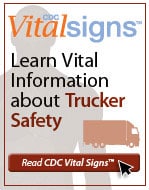Studies – Long-Haul Truck Drivers

NIOSH Studies
National Survey of Long-Haul Truck Driver Health and Injury
In 2010, NIOSH surveyed long-haul truck drivers in the United States to determine national estimates of work-related safety and health conditions. Survey results, published in 2014, suggest a need for a tailored approach to prevent injury and illness among long-haul truck drivers to improve overall driver health.
How was the survey conducted?
Data were collected during personal interviews with 1,265 long-haul truck drivers at 32 different truck stops across the 48 contiguous United States. The numbers of long-haul truck drivers with certain health conditions and behaviors that make injury and illness more likely were compared to national estimates of the 2010 U.S. adult working population from the 2010 National Health Interview Survey. Personal interviews consisted of questions on truck driving history, work practices, driving environment, fatigue, sleep, injury history, health and medical conditions, and demographics.
A complete description of the methods used to complete this survey can be found in this journal article.
Who collaborated on this survey?
Federal Motor Carrier Safety Administration (FMCSA)external icon, within the U.S. Department of Transportation (DOT)external icon, provided partial funding for the U.S. National Survey of Long-haul Truck Driver Health and Injury. FMCSA develops and enforces regulations to reduce crashes, injuries, and fatalities involving large trucks and buses.
How can findings from this study be used?
Survey results can be used to inform the development of interventions. The data can be used as benchmarks to measure the effectiveness of programs to reduce injury and illness. NIOSH is exploring different ways to share these findings and other health information with the trucking industry. Contact the project officer, Karl Sieber, if you are interested in learning more about this study or partnering with NIOSH to move this research into practice.
We wish to thank all participating truck stops and drivers without whom this data collection would not have been possible.

